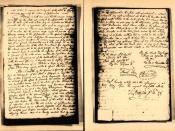Protruding from the American Revolution, the solidifying institutions of the United States were left open to new ideas. Men such as John Dickinson began forming ideas of a strong centralized government, ignorant to the effects of the grandeur power abused by Parliament of Britain. Immediately the various states challenged this suggestion and groups of democratic-republicans stressed a loose confederation of states where people were sovereign. These ideals were summarized in the Articles of Confederation, which provided the United States with an effective government from 1781-1789 by suiting republican political ideals for the people, and providing well-rounded socio-economic foundations.
Pre-revolutionary war ideals consisted of John Locke's theory of the masses' unalienable rights, and their power over the government so if necessary, the people can rebel against arbitrary forms of government. The Articles of Confederation provided this power to the people with the Land Ordinance of 1787, establishing a governor, secretary, and three judges for the territories in the Northwest that it separated.
This issued much power at local levels and would present much of the republican thought of the era. Pre-war ideas could also be seen as the Confederation portrayed an image of the Commonwealth men, who from the ideas of John Trenchard and Thomas Gordon, spoke of power as a dangerous liberty to be countered by virtue. These ideas were strongly endorsed by the Articles, as they made sure to balance the power equally. Republican ideals of power commented that it would be inherently dangerous and would need to be restrained by controlling federal authority, which the Articles effectively did as in Article II, which provided the state with sovereignty in freedom and independence. There was not a complete break with the government as it was still centralized with three departments: Foreign Affairs, War, and Finance. This...


